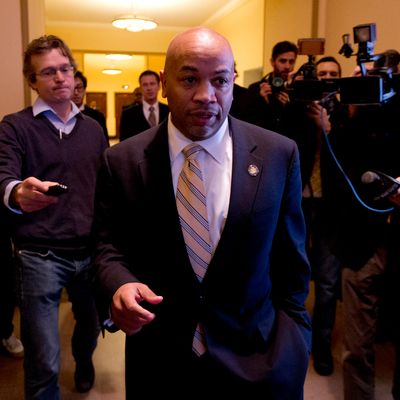
Carl Heastie clearly has significant political skills all his own. In 2008, the amiable former math major became the Bronx Democratic Party boss after helping overthrow the incumbent. Last week, Heastie swiftly consolidated the necessary backing to get himself elected the new speaker of the State Assembly; then he moved up the vote by seven days, sealing the deal before anything could go wrong.
And yesterday, after having been sworn in to replace the scandal-scarred Sheldon Silver, Heastie was canny enough to say the right words about ethics reform, even if there’s little in his career so far to show he believes it’s a priority. “Carl is a listener, and that’s how he leads,” a sometime political partner says.
Yet Heastie could not have grabbed power alone. “Carl is smart,” a Democratic strategist says. “But it helps in politics when the other players decide you’re the one who could be the most useful to them.”
There’s the real-estate industry, for instance. Heastie is close to Stanley Schlein, a lawyer, a lobbyist for developers, and an all-around New York fixer for decades. “You know the joke about species that will survive a nuclear holocaust?” a capitol insider says. “Stanley is one of them.”
Governor Andrew Cuomo, after a brief unsuccessful push for Rochester’s Joe Morelle, largely stayed on the sidelines during the Assembly maneuvering. Which in itself was something of an endorsement: If Cuomo thought Heastie objectionable he would have found a way to share his feelings.
The nimblest behind-the-scenes work, though, seems to have been done by Mayor Bill de Blasio. Losing Silver as a legislative ally was a serious blow to de Blasio’s Albany agenda, but as the jockeying to choose a new speaker unfolded the mayor declared publicly that “I’m not supporting anyone.”
There is, of course, a lot of room between waving pom-poms and being a complete bystander. “The mayor didn’t need to make calls himself to let his preferences be known,” a Democratic operative says. “His friends in the labor unions did the job for him. Look at what happened with the Brooklyn Assembly delegation.”
A number of Brooklyn assemblymembers initially seemed open to the candidacy of Keith Wright, from Harlem. Wright had gotten a jump in the contest by becoming the first prominent assemblyman to declare that Silver needed to step down. But then Heastie made an alliance with the Queens Democratic organization.“Brooklyn started to get nervous about being on the losing side,” the Democratic strategist says. “And de Blasio has influence with a lot of the Brooklyn members, especially the younger, newer ones.” De Blasio allies also helped broker peace between Heastie and Frank Seddio, the Brooklyn Democratic Party boss. Brooklyn’s votes started moving in Heastie’s direction.
Heastie had done de Blasio a big favor in 2009, helping keep de Blasio on the public advocate ballot. Last year, though, de Blasio’s push for Melissa Mark-Viverito as City Council speaker put him in conflict with Heastie; assisting Heastie now salves that friction, and could have collateral benefit for de Blasio down the road. “Scott Stringer clearly wants to run for mayor in 2017, and lately he’s had a better relationship with Keith Wright,” an uptown Democrat says. “It might have been a problem for de Blasio to have Wright elevated to speaker and then teaming up with Stringer in Manhattan.”
Wright stepped out of the way as Heastie gained momentum, which could help him land a decent consolation prize. Wright has long been interested in succeeding Charlie Rangel in Congress. Rangel’s district now includes a larger section of the Bronx — a place where, in a 2016 Democratic primary, being on good terms with the new speaker of the State Assembly, Carl Heastie, could be very useful.





























